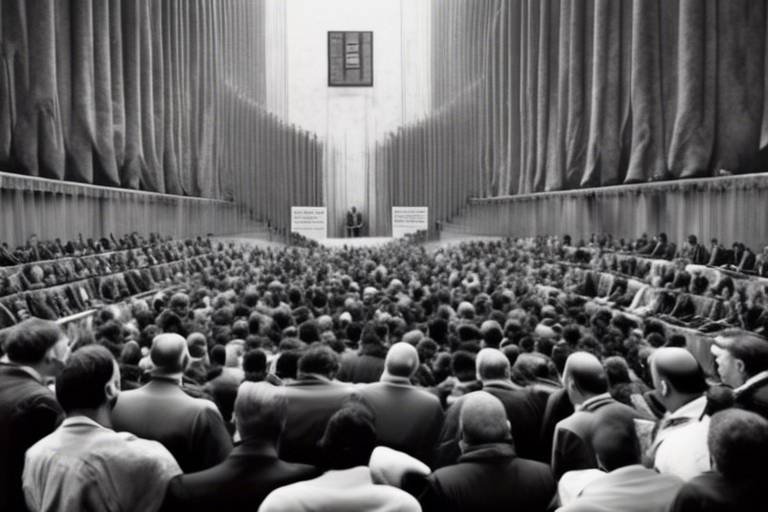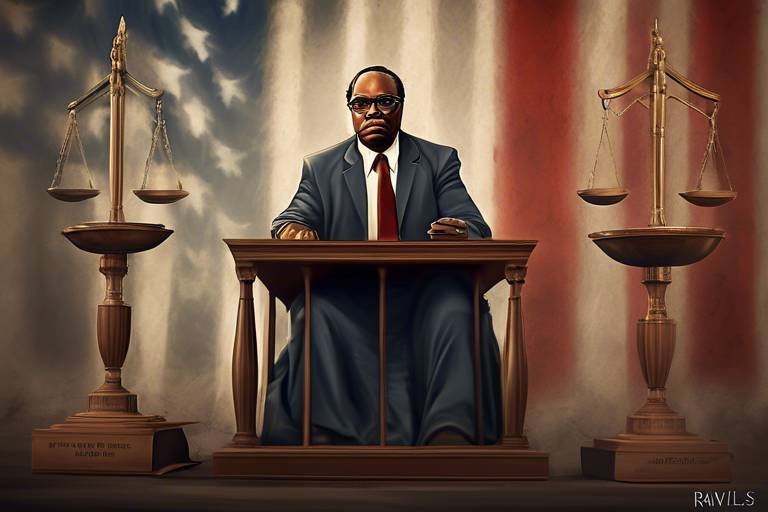Can Philosophy Influence a Nation’s Politics?
The intricate relationship between philosophy and politics is a fascinating subject that has sparked debates for centuries. At first glance, one might wonder, "How can abstract ideas shape the concrete world of governance?" The answer lies in the profound ways philosophical concepts underpin our understanding of political systems, ethics, and public policy. Philosophy is not just an academic exercise; it is the very lens through which we view justice, authority, and rights. Think about it—every time a new law is proposed or a political debate heats up, underlying philosophical ideas are at play, shaping the discourse and influencing decisions.
Consider how different nations interpret the concept of justice. In some cultures, justice is viewed through a communal lens, emphasizing collective well-being, while in others, it leans towards individual rights and freedoms. This divergence can lead to vastly different political systems and policies. For instance, countries with a strong emphasis on individualism, like the United States, often prioritize personal liberties in their laws, whereas nations that focus on collectivism, such as China, may prioritize societal harmony over individual rights.
Moreover, the role of political philosophy is not static; it evolves alongside society. As new challenges arise—be it economic inequality, climate change, or global conflicts—philosophers and political theorists provide frameworks that help us navigate these complexities. They ask essential questions: What does it mean to be a just society? How should power be distributed? What ethical responsibilities do leaders have towards their citizens? These inquiries are not merely theoretical; they have real-world implications that can lead to changes in legislation and public policy.
As we delve deeper into the historical context, we see that philosophers like Plato, Aristotle, and John Locke laid the groundwork for modern political thought. Their ideas continue to resonate today, influencing contemporary political ideologies and practices. For example, Locke's theories on government by consent and the protection of natural rights have significantly shaped democratic principles worldwide. In essence, the philosophical underpinnings of a nation can often dictate its political landscape, impacting everything from governance structures to civil rights.
In summary, the influence of philosophy on a nation’s politics is profound and multifaceted. It shapes our understanding of governance, informs ethical considerations, and guides the evolution of civil rights. As we navigate the complexities of modern political landscapes, recognizing the philosophical roots of our systems can provide valuable insights into the challenges and opportunities that lie ahead.
- How does philosophy influence political decision-making? Philosophy provides the ethical frameworks and theoretical foundations that guide lawmakers in their decisions, helping them navigate complex moral dilemmas.
- Can philosophical ideas change over time? Absolutely! As societies evolve and face new challenges, philosophical ideas adapt, leading to shifts in political ideologies and practices.
- Are there specific philosophers whose ideas have had a significant impact on modern politics? Yes, philosophers like John Locke, Thomas Hobbes, and Jean-Jacques Rousseau have profoundly influenced contemporary political thought and systems.
- What role does ethics play in governance? Ethics is critical in governance as it establishes legitimacy and accountability, guiding lawmakers to create policies that align with societal values.

The Role of Political Philosophy
Political philosophy serves as the bedrock of political systems, providing essential theories that shape our understanding of governance. It’s not just a collection of abstract ideas; rather, it’s a dynamic framework that influences how societies operate and how leaders are held accountable. When we think about concepts like justice, rights, and authority, we are delving into the core of political philosophy. These concepts help us navigate the complexities of power dynamics and societal obligations.
At its essence, political philosophy challenges us to ask critical questions: What does it mean to be just? Who holds the authority to govern? And what rights should every individual possess? These inquiries are crucial in shaping public policy and governance. For instance, the political philosophies of thinkers like John Locke and Thomas Hobbes have laid the groundwork for modern democratic principles, influencing how we perceive individual rights and state power.
Moreover, political philosophy does not exist in a vacuum. It evolves alongside societal changes and reflects the values and aspirations of the people. When political theorists propose new ideas, they often do so in response to the pressing issues of their time—be it inequality, war, or civil rights. This adaptability ensures that political philosophy remains relevant, guiding lawmakers and citizens alike in their quest for a fair and just society.
To illustrate the impact of political philosophy on governance, consider how different political ideologies prioritize various aspects of society. For example:
- Liberalism emphasizes individual rights and freedoms, advocating for limited government intervention.
- Socialism focuses on social ownership and democratic control of the means of production, aiming for equality.
- Conservatism prioritizes tradition and social stability, often resisting rapid change.
Each of these ideologies stems from philosophical roots, demonstrating how deeply intertwined philosophy is with political practice. The debates and discussions within political philosophy not only shape the laws we follow but also influence our collective consciousness about what it means to live in a society.
In conclusion, the role of political philosophy is not merely theoretical; it is a practical guide that informs governance and public policy. By understanding the philosophical underpinnings of political thought, we gain insight into the values that drive our political systems and the ethical considerations that must be addressed to create a just society.

Historical Philosophical Influences
The tapestry of political thought is richly woven with the threads of philosophical inquiry that have shaped nations over centuries. From the ancient musings of Plato to the revolutionary ideas of Rousseau, each philosopher has left an indelible mark on the political landscape. These thinkers didn’t just ponder abstract concepts; they challenged the very foundations of governance and authority, urging societies to rethink their structures and principles.
Take, for instance, the works of Aristotle, who emphasized the importance of virtue ethics in politics. He believed that a good government should cultivate virtuous citizens, which in turn would lead to a just society. His ideas on citizenship and the role of the state have influenced democratic systems, encouraging leaders to consider the moral implications of their policies. Similarly, John Locke introduced the notion of natural rights, positing that individuals are entitled to life, liberty, and property. This idea was revolutionary and laid the groundwork for modern democracy, particularly in the formation of the United States’ Declaration of Independence.
Throughout history, philosophers have often been at the forefront of political movements, advocating for change and reform. The Enlightenment period, for example, was a hotbed of philosophical thought that questioned the status quo. Thinkers like Voltaire and Montesquieu championed ideas about freedom of speech and the separation of powers, concepts that are now fundamental to democratic governance. Their works inspired revolutions, including the American and French Revolutions, where the populace sought to implement these philosophical ideals into their political systems.
Moreover, Karl Marx introduced a critical perspective on capitalism and class struggle, arguing that the economic base of society shapes its political superstructure. His ideas sparked movements across the globe, influencing numerous political ideologies and leading to the establishment of socialist states. Marx's critique of capitalism and his vision for a classless society continue to resonate in contemporary political discourse, challenging the norms of capitalist democracies.
In the modern era, philosophers like Hannah Arendt and John Rawls have further contributed to political philosophy by addressing issues of justice, totalitarianism, and the moral responsibilities of citizens. Arendt’s exploration of the nature of power and evil, particularly in her analysis of totalitarian regimes, serves as a cautionary tale of political apathy and the consequences of unchecked authority. Meanwhile, Rawls’ theory of justice as fairness has influenced contemporary discussions around social justice and equality, urging policymakers to consider the least advantaged members of society in their decisions.
The impact of these historical philosophical influences is profound. They not only shaped the political ideologies of their time but also continue to inform modern governance. As we look at the political systems around the world today, it is evident that the philosophical foundations laid by these thinkers are still very much alive, guiding leaders and citizens alike in their quest for justice, equality, and a better society.
- How did Plato's ideas influence modern democracy?
Plato's concept of the ideal state and the philosopher-king has influenced the way we think about leadership and governance, emphasizing the need for wise and virtuous rulers. - What role did Enlightenment thinkers play in political revolutions?
Enlightenment philosophers provided the intellectual foundation for revolutions by advocating for individual rights and questioning traditional authority, leading to significant political changes. - How do Marx's ideas affect current political thought?
Marx's critique of capitalism and his vision for a classless society continue to inspire discussions around economic inequality and social justice movements today.

Ethics and Governance
When we talk about ethics in governance, we are diving into the deep waters of morality and decision-making that affect every aspect of our lives. Imagine a ship sailing through a stormy sea; the captain's moral compass determines whether they will steer the crew to safety or into peril. Similarly, ethical considerations in governance are essential for establishing legitimacy and accountability. They guide lawmakers in crafting policies that not only reflect societal values but also uphold moral obligations, impacting citizens' lives in profound ways.
At the heart of ethical governance lies the question: what is the right thing to do? This question isn't just a philosophical musing; it has real-world implications. For instance, when governments decide on issues like healthcare, education, and social welfare, they must consider the ethical ramifications of their policies. Are they promoting justice? Are they ensuring equality? Are they respecting the rights of their citizens? These questions shape the very fabric of society.
Moreover, ethical governance requires transparency and accountability. Citizens have the right to know how decisions are made and who is making them. This is where the concept of public trust comes into play. When leaders act with integrity and prioritize the common good, they foster a sense of trust among the populace. Conversely, when ethical lapses occur—say, through corruption or abuse of power—the consequences can be devastating, leading to public outrage and a breakdown of social cohesion.
To illustrate this further, consider the following table that outlines key ethical principles in governance:
| Ethical Principle | Description |
|---|---|
| Integrity | Adherence to moral and ethical principles, ensuring honesty in governance. |
| Accountability | Responsibility of leaders to justify their actions and decisions to the public. |
| Transparency | Openness in government processes, allowing citizens to see how decisions are made. |
| Equity | Fair treatment of all citizens, ensuring equal access to resources and opportunities. |
In essence, the connection between ethics and governance is like the relationship between the roots of a tree and its trunk. The roots, representing ethical principles, provide stability and nourishment, allowing the trunk—symbolizing governance—to stand tall and strong. Without a solid ethical foundation, governance can become weak and susceptible to corruption, inefficiency, and injustice.
As we navigate the complexities of modern governance, it’s crucial to remember that ethics should not be an afterthought; they must be woven into the very fabric of political decision-making. This is where the role of citizens becomes vital. Active participation in governance—through voting, advocacy, and community engagement—ensures that ethical considerations remain at the forefront of political discourse. After all, a society that values ethics in governance is one that fosters trust, justice, and a brighter future for all.
- What is the role of ethics in governance?
Ethics in governance ensures that decisions made by leaders are just, transparent, and accountable to the public. - How can citizens promote ethical governance?
Citizens can promote ethical governance by actively participating in the political process, advocating for transparency, and holding leaders accountable. - What happens when ethics are ignored in governance?
Ignoring ethics can lead to corruption, loss of public trust, and a breakdown of social cohesion, ultimately harming society.

Philosophy and Civil Rights
Philosophy has served as a powerful catalyst for the advancement of civil rights throughout history. At its core, philosophical inquiry delves into the fundamental questions of justice, equality, and human dignity. These concepts are not merely abstract ideas; they are the bedrock upon which civil rights movements are built. Think about it: when activists rally for equality, they are often invoking philosophical arguments that challenge the status quo, demanding a re-examination of societal values and norms.
Consider the influential works of philosophers like John Locke, whose theories about natural rights laid the groundwork for modern democracy and human rights. Locke argued that individuals possess inherent rights to life, liberty, and property, ideas that inspired the founding documents of many nations. His philosophy underscores the notion that all individuals are entitled to certain inalienable rights, a principle that continues to resonate in civil rights discussions today.
Moreover, the writings of Immanuel Kant introduced the concept of treating individuals as ends in themselves, rather than means to an end. This ethical framework has profound implications for civil rights, as it emphasizes the importance of recognizing each person's intrinsic value. When we apply Kant's philosophy to civil rights, it becomes clear that advocating for the rights of marginalized groups is not just a legal obligation but a moral imperative.
In the 20th century, philosophers like Martin Luther King Jr. and Angela Davis synthesized philosophical thought with activism, using ethical principles to challenge systemic injustices. King's famous "I Have a Dream" speech is not just a political statement; it is steeped in philosophical ideals about justice and equality, drawing from the works of both Plato and Gandhi. Similarly, Davis's advocacy for prison abolition is rooted in a deep philosophical critique of societal structures that perpetuate inequality.
To illustrate the connection between philosophy and civil rights, we can look at key philosophical concepts that have influenced various civil rights movements:
| Philosopher | Key Concept | Impact on Civil Rights |
|---|---|---|
| John Locke | Natural Rights | Foundation for human rights and democracy |
| Immanuel Kant | Respect for Individuals | Emphasis on intrinsic human dignity |
| Martin Luther King Jr. | Nonviolent Resistance | Mobilized movements for racial equality |
| Angela Davis | Intersectionality | Broadened understanding of social justice issues |
Philosophy does not merely inform civil rights movements; it actively shapes their trajectories. Theoretical frameworks surrounding equality and justice inspire activists to demand legislative changes that protect individual freedoms. For instance, the debates surrounding gender equality and LGBTQ+ rights are deeply rooted in philosophical discussions about identity and justice. These movements often reference philosophical arguments to advocate for their causes, emphasizing how crucial philosophical discourse is to the fight for civil rights.
As we look toward the future, the interplay between philosophy and civil rights will continue to evolve. Emerging issues, such as digital privacy and climate justice, will require new philosophical frameworks to address the rights of individuals and communities. The challenge lies in adapting philosophical thought to contemporary issues, ensuring that the pursuit of civil rights remains dynamic and responsive to societal changes.
- How has philosophy historically influenced civil rights movements?
Philosophy has provided the foundational ideas of justice, equality, and human dignity that inspire activists to challenge injustices and advocate for legal reforms. - Which philosophers are most associated with civil rights?
Philosophers like John Locke, Immanuel Kant, Martin Luther King Jr., and Angela Davis have significantly shaped the discourse surrounding civil rights through their influential ideas. - What role does philosophy play in contemporary civil rights issues?
Philosophy continues to inform discussions around modern issues like gender equality, LGBTQ+ rights, digital privacy, and climate justice, guiding activists in their advocacy efforts.

Philosophy in Political Rhetoric
Political rhetoric is more than just a collection of words; it’s an art form that can stir emotions, provoke thought, and inspire action. At its core, it often draws from philosophical principles to craft messages that resonate with the public. Think of it as a recipe where the ingredients are philosophical ideas, and the outcome is a dish that can either unite or divide a nation. For instance, when leaders invoke concepts like freedom or justice, they are not just using catchy slogans; they are tapping into deep philosophical traditions that shape how we think about our rights and responsibilities.
Throughout history, political leaders have harnessed philosophical arguments to persuade and mobilize citizens. Take the Declaration of Independence in the United States, which is steeped in the Enlightenment philosophy of thinkers like John Locke. It argues for the inherent rights of individuals and the government's role in protecting those rights. Such documents don't just communicate policy; they encapsulate a philosophical worldview that has lasting implications for national identity and governance.
Moreover, the effectiveness of political rhetoric often hinges on its ability to connect with the audience’s values and beliefs. This is where philosophy plays a crucial role. By framing issues within a philosophical context, politicians can evoke both emotional and rational responses. For example, when discussing climate change, a leader might frame it as a moral obligation to future generations, appealing to the philosophical idea of intergenerational justice. This not only resonates on an emotional level but also invites the audience to engage in a rational discourse about their responsibilities.
In contemporary politics, we see a wide array of philosophical influences shaping rhetoric. Here are a few notable examples:
- Utilitarianism: Politicians may argue for policies that promote the greatest good for the greatest number, using this ethical framework to justify decisions.
- Feminist Theory: Rhetoric around gender equality often draws on feminist philosophical ideas, pushing for policies that address systemic injustices.
- Environmental Ethics: The discourse surrounding climate action frequently incorporates philosophical arguments about our moral duty to the planet and future generations.
Additionally, the use of philosophical rhetoric can often be a double-edged sword. While it can inspire and mobilize, it can also polarize. For instance, political leaders might selectively use philosophical arguments to create a narrative that aligns with their agenda, leading to a misinterpretation of philosophical ideals. This selective use can distort public understanding and create divisions among citizens.
In conclusion, the relationship between philosophy and political rhetoric is profound and multifaceted. Philosophical ideas not only enrich the language of politics but also shape the very fabric of our societal discourse. As we navigate the complexities of modern governance, understanding this interplay can provide valuable insights into the motivations behind political messages and the potential impact on public opinion.
- How does philosophy influence political speeches? Political speeches often incorporate philosophical ideas to resonate with audiences, evoke emotions, and justify actions.
- Can political rhetoric be misleading? Yes, political rhetoric can be selectively framed to support a specific agenda, potentially distorting philosophical ideals.
- What role does ethics play in political discourse? Ethics guide the moral considerations of policies and decisions, influencing how leaders communicate their vision and values.

Contemporary Philosophical Movements
In today’s fast-paced world, contemporary philosophical movements are not just academic discussions; they are vibrant forces that challenge the status quo and reshape political ideologies. These movements, often rooted in deep ethical considerations, bring forth ideas that resonate with the changing dynamics of society. For example, feminism has evolved from its early waves to encompass a broad spectrum of issues, advocating for gender equality not only in political spheres but also in social and economic contexts. This movement has inspired legislation aimed at dismantling systemic inequalities, pushing for equal pay, reproductive rights, and representation in leadership roles.
Similarly, the rise of environmentalism has sparked a philosophical discourse around our duty to the planet. It challenges us to rethink our relationship with nature and encourages policies that prioritize sustainability over short-term gains. This movement has led to significant advocacy for climate change legislation, pushing governments to adopt greener practices and consider the long-term impact of their policies on the environment.
Moreover, the social justice movement has gained momentum, advocating for the rights of marginalized communities. Philosophical frameworks around justice and equality have fueled this movement, encouraging activists to address issues such as systemic racism, economic disparity, and LGBTQ+ rights. The intersectionality of these movements highlights the complexity of contemporary issues, showing how various forms of oppression are interconnected.
These philosophical movements are not isolated; they interact and often overlap, creating a rich tapestry of ideas that influence public policy. For instance, the dialogue between feminism and environmentalism has led to the emergence of ecofeminism, which examines the connections between the exploitation of the environment and the oppression of women. Such interdisciplinary approaches are crucial in addressing the multifaceted challenges we face today.
As we navigate through the complexities of modern governance, it is essential to recognize how these contemporary philosophical movements shape our political landscape. They challenge traditional norms and push for a more inclusive and equitable society. The ideas born from these movements not only inspire activists but also influence lawmakers and public opinion, ultimately leading to significant changes in legislation and societal attitudes.
- What is the role of contemporary philosophical movements in politics?
Contemporary philosophical movements play a crucial role in shaping political ideologies, influencing public policies, and advocating for social change. - How do these movements interact with each other?
Many contemporary movements overlap in their goals and philosophies, creating interdisciplinary approaches that address complex societal issues. - Can philosophical movements lead to legislative change?
Yes, philosophical movements often inspire activists and lawmakers to create and reform legislation that reflects their values and goals.

Philosophy and National Identity
The connection between philosophy and national identity is profound and multifaceted. Philosophical ideas often serve as the bedrock upon which nations build their identities, shaping everything from cultural norms to political ideologies. For instance, consider how the Enlightenment thinkers, such as John Locke and Jean-Jacques Rousseau, laid the groundwork for modern democratic principles. Their concepts of individual rights and social contracts resonate deeply within the fabric of many nations, influencing how citizens view their role and responsibilities within the state.
Moreover, national identity is not just about the political framework; it's also tied to shared values and beliefs that unite a population. These values often stem from philosophical discourse that emphasizes the importance of community, justice, and equality. For example, in countries like the United States, the philosophical underpinnings of liberty and justice for all are enshrined in foundational documents like the Declaration of Independence and the Constitution. These documents reflect a collective ethos that informs the national identity, guiding citizens in their understanding of freedom and responsibility.
Philosophy also helps to define what it means to belong to a nation. This sense of belonging can be influenced by various philosophical movements, such as nationalism, which emphasizes a shared identity based on culture, language, and history. In contrast, cosmopolitanism advocates for a more global identity, suggesting that individuals should see themselves as part of a larger human community rather than being confined by national borders. This philosophical tension raises important questions: What does it mean to be a citizen? How do we balance national pride with global responsibility?
To illustrate the impact of philosophy on national identity, we can look at the following table that summarizes key philosophical ideas and their influence on different nations:
| Philosopher | Key Idea | Influenced Nation |
|---|---|---|
| John Locke | Natural rights and government by consent | United States |
| Jean-Jacques Rousseau | Social contract and general will | France |
| Karl Marx | Class struggle and societal change | Various socialist nations |
| Friedrich Nietzsche | Will to power and individualism | Germany |
As nations grapple with their identities in an increasingly interconnected world, philosophical discourse remains crucial. The debates around nationalism versus globalism, individual rights versus collective good, and tradition versus progress are all steeped in philosophical inquiry. These discussions not only shape national policies but also influence how citizens perceive themselves and their roles within society.
In summary, the interplay between philosophy and national identity is a dynamic and evolving relationship. As societies continue to change, the philosophical frameworks that inform national identities will also adapt, reflecting new realities and challenges. This ongoing dialogue between philosophy and identity is essential for fostering an inclusive and cohesive society where diverse perspectives can coexist and thrive.
- How does philosophy shape national identity? Philosophy provides the foundational ideas and values that define what it means to belong to a nation, influencing cultural norms and political ideologies.
- Can philosophical movements impact legislation? Yes, philosophical movements can inspire legislation aimed at protecting individual rights and promoting social justice.
- What role do historical philosophers play in modern politics? Historical philosophers often provide the theoretical frameworks that guide contemporary political thought and practices.
- How do globalization and philosophy interact? Globalization introduces diverse philosophical perspectives that can challenge traditional national identities, leading to hybrid political systems.

The Impact of Globalization
Globalization is a powerful force that has reshaped the political landscape of nations around the world. It is not just about the exchange of goods and services; it encompasses a complex web of cultural, social, and philosophical interactions that influence how countries govern themselves. As borders blur and ideas flow more freely than ever, the impact of globalization on political philosophy becomes increasingly significant.
One of the most profound effects of globalization is the introduction of diverse philosophical perspectives into national politics. Think about it: when different cultures and ideologies collide, they don’t just coexist; they interact, challenge, and often reshape one another. This can lead to the emergence of hybrid political systems that blend elements from various traditions. For instance, the integration of Eastern philosophical concepts of harmony and community can influence Western notions of individualism and democracy, resulting in a more nuanced approach to governance.
Moreover, globalization has sparked a dialogue around universal values, such as human rights and environmental sustainability. These discussions often draw from philosophical traditions that advocate for the common good, prompting nations to rethink their policies in light of global standards. For example, international agreements on climate change reflect a growing recognition of our collective responsibility to the planet, urging countries to adopt policies that may not have been prioritized in a more insular political climate.
However, the impact of globalization is not without its challenges. As nations grapple with the influx of new ideas, there can be a pushback against perceived threats to national identity and sovereignty. This tension often manifests in political rhetoric, where leaders may invoke philosophical arguments to rally support for protectionist measures. It raises an important question: how do we balance the benefits of a globalized world with the need to preserve our unique cultural identities?
In this context, it’s crucial to consider the role of education in shaping a globally aware citizenry. Educational institutions are increasingly tasked with fostering critical thinking and openness to diverse viewpoints, equipping individuals with the tools to navigate and contribute to a globalized society. The philosophical underpinnings of education can determine how well societies adapt to these changes, emphasizing the importance of teaching not just local history and values, but also global citizenship.
As we look to the future, the interplay between globalization and political philosophy will undoubtedly continue to evolve. The rise of digital technology, for instance, offers new avenues for philosophical discourse, allowing ideas to spread rapidly across the globe. This connectivity can lead to a richer exchange of thoughts and theories, but it also poses questions about the authenticity of these ideas when they are stripped of their cultural contexts.
In conclusion, globalization serves as both a challenge and an opportunity for political philosophy. It compels us to rethink our assumptions about governance, ethics, and identity in an increasingly interconnected world. As we move forward, it will be essential for nations to engage thoughtfully with the philosophical implications of globalization, ensuring that their political systems reflect not only their unique histories but also their roles in a global community.
- What is globalization? Globalization refers to the process by which businesses, cultures, and economies become interconnected on a global scale, leading to increased interaction and exchange.
- How does globalization affect political philosophy? Globalization introduces diverse philosophical perspectives, leading to hybrid political systems and prompting nations to reconsider their policies in light of global values.
- What role does education play in globalization? Education fosters critical thinking and openness to diverse viewpoints, preparing individuals to navigate and contribute to a globalized society.
- What are the challenges of globalization? Globalization can lead to tensions regarding national identity and sovereignty, as well as questions about the authenticity of cultural ideas in a global context.

Future Directions in Political Philosophy
The landscape of political philosophy is ever-evolving, constantly adapting to the challenges and realities of contemporary society. As we stand on the brink of unprecedented changes brought about by technology, climate change, and globalization, the questions we face are more complex than ever. How do we reconcile the rapid advancement of artificial intelligence with ethical governance? What responsibilities do nations have towards one another in an interconnected world? These are just a few of the pressing issues that will shape the future of political philosophy.
One of the most significant areas of exploration will be the impact of technology on governance and individual rights. With the rise of big data and surveillance, philosophers are questioning the balance between security and privacy. Are we sacrificing our freedoms for the illusion of safety? This debate will likely lead to new theories that seek to redefine the relationship between citizens and the state, emphasizing the need for transparency and accountability in the digital age.
Additionally, the climate crisis presents a moral imperative that philosophers cannot ignore. The ethical implications of environmental degradation and climate change require a reevaluation of our responsibilities not just to our contemporaries but also to future generations. This has led to the emergence of eco-philosophy, which advocates for sustainable practices and policies. As nations grapple with environmental policies, political philosophers will play a crucial role in shaping the dialogue around justice and equity in climate action.
Furthermore, globalization has introduced a myriad of cultural perspectives that challenge traditional political norms. As different ideologies collide, the potential for hybrid political systems arises, necessitating a philosophical framework that can accommodate diverse viewpoints. This will require a shift from ethnocentric political theories to more inclusive approaches that consider the global context of governance.
In addition to these challenges, issues surrounding social justice will continue to dominate political discourse. Movements advocating for racial, gender, and economic equality are reshaping societal values and expectations. Philosophers must engage with these movements, interpreting and critiquing the underlying principles that drive them. This engagement not only enriches political philosophy but also ensures that it remains relevant in addressing the needs of marginalized communities.
As we look to the future, it is clear that political philosophy will not only respond to these challenges but will also be instrumental in shaping the frameworks through which we understand and engage with them. The dialogue between philosophy and politics will become increasingly vital, as we seek to create systems that are not only effective but also just and equitable.
- What is political philosophy? Political philosophy is the study of fundamental questions about the state, government, politics, liberty, justice, and the enforcement of a legal code by authority.
- How does philosophy influence politics? Philosophy provides the foundational theories and ethical frameworks that inform political systems and guide the creation of laws and policies.
- What are some contemporary issues in political philosophy? Current issues include the impact of technology on privacy, climate change ethics, globalization's effects on governance, and social justice movements.
- Why is political philosophy important? It helps us understand and critically evaluate the principles that govern our societies, guiding us toward fairer and more effective political systems.
Frequently Asked Questions
- How does political philosophy influence governance?
Political philosophy lays the groundwork for how societies understand governance. It explores fundamental concepts like justice, rights, and authority, which shape the responsibilities of leaders and the expectations of citizens. Essentially, it’s like the blueprint for building a house—without it, the structure may not stand firm.
- What historical philosophers have impacted political thought?
Throughout history, several philosophers have left a lasting mark on political thought. Thinkers like Plato, Aristotle, and Rousseau have shaped ideas about democracy, governance, and individual rights, creating a rich tapestry of thought that continues to influence modern political landscapes.
- Why are ethics important in governance?
Ethics are crucial in governance because they establish the legitimacy and accountability of political leaders. They help lawmakers create policies that reflect societal values and moral obligations, ensuring that governance aligns with what citizens deem right and just. It’s like having a moral compass guiding decision-making for the greater good.
- How has philosophy influenced civil rights movements?
Philosophical discourse has been a driving force behind civil rights movements. Theoretical frameworks surrounding equality and justice have inspired countless activists, shaping legislation that protects individual freedoms. It’s akin to planting seeds of change that grow into a forest of rights and liberties for all.
- In what ways do political leaders use philosophical rhetoric?
Political leaders often harness philosophical arguments to persuade citizens. By grounding their rhetoric in philosophical thought, they can evoke both emotional and rational responses, significantly influencing public opinion and electoral outcomes. It’s like using a powerful magnet to draw people’s beliefs closer to their agenda.
- What contemporary philosophical movements are influencing politics today?
Modern movements such as feminism, environmentalism, and social justice are challenging traditional political norms and prompting shifts in policies and societal attitudes. These philosophies encourage a re-examination of existing frameworks, pushing for a more inclusive and equitable political landscape.
- How does philosophy shape national identity?
The philosophical ideals of a nation often reflect in its national identity. These ideals influence how citizens perceive their roles within the state and their responsibilities to one another. It’s like the glue that binds a community together, creating a shared sense of purpose and belonging.
- What is the impact of globalization on political philosophy?
Globalization introduces diverse philosophical perspectives into national politics, leading to hybrid political systems. This interplay of different ideologies affects governance and policy-making, making it essential for nations to adapt and evolve in an increasingly interconnected world.
- What future challenges will shape political philosophy?
As societies continue to evolve, emerging issues like technology, climate change, and globalization will challenge and reshape political philosophy. These factors will necessitate new frameworks and ideas to address the complexities of modern governance, ensuring that political thought remains relevant and effective.



















